Matt [Anshar Studios]
Anshar Studios

- Joined
- Aug 8, 2019
- Messages
- 61

















Cyberpunk RPG Gamedec introduces its seedy neon underbelly
Welcome to Low City.
Gamedec is a cyberpunk RPG about a virtual sleuth that I've had my eye on since it was announced in August. Quests and combat are replaced with cases involving crimes in VR, which you'll have to solve through interrogation, hacking and following the evidence until you're ready to come to a conclusion. In its first dev diary, which you can watch above, we learn a bit more about Low City, the seedy part of town.
While gamedecs solve crimes in VR, you'll still spend time in meatspace. Gamedec is set in Warsaw, but so far we've only seen glimpses of Low City and some of the virtual worlds we'll be able to visit.
Marcin Przybyłek, author of the Gamedec books, explains that he's fascinated with elevated cities with suspended walkways and no ground in sight, citing Fifth Element and Core Design's 2001 sci-fi action-adventure, Project Eden as two of his main inspirations. Warsaw, then, is teeming with massive skyscrapers connected by bridges and is no place to live for anyone with vertigo.
Low City, where it's perpetually dark, is home to lots of night clubs and gangsters, and below that are the ruins of old Warsaw, where scavengers root around for artefacts, books and other pieces of Warsaw's history. If you're visiting it to meet a client and begin an investigation, you might be robbed, ripped off or get into some bother with the local gangsters, but there's no combat system in Gamedec. That doesn't mean things can't descend into violence, but expect to spend a lot more time chatting.
Gamedec lets you pick skills and backgrounds that might make things easier as you navigate futuristic Warsaw's neon underbelly, as well as when you're trying to crack a case in VR. While skills depend on rolls initially, enough successes will turn them into a permanent aspect of your personality that no longer relies on RNG.
Unlike Cyberpunk 2077, Gamedec isn't based on a tabletop RPG, but it's definitely got tabletop sensibilities. More, perhaps. Before they're added to the game, cases are prototyped in pen-and-paper sessions where players can throw out ideas and solutions they've come up with, then the most compelling or popular ones become in-game solutions.
More than any other RPG, I'm reminded of Disco Elysium. They're both investigative and lack combat systems, and Disco Elysium was similarly inspired by tabletop roleplaying. As much as I love getting in brawls in games like Divinity: Original Sin 2, I spend most of my time in RPGs trying to avoid combat. What type of person gets in 20 fights a day? That's not an adventure, it's a massacre, and I'm keen to see more developers not treat it as a necessity.
Gamedec is due out next year.















Welcome to Low City! Take a quick tour around one of the Warsaw City’s levels and find out why the Gamedec like you should consider visiting this place. In the first dev-diary video, Łukasz Hacura (Executive Producer) and Marcin Przybyłek (Author of Gamedec book series) share the inspirations and new details about Low City map.


Low City is a place where, even on a sunny day, it’s so dark you can’t get by without artificial lighting. It’s where apartment prices plummet, Public Transport Tubes terminate, and aurocar stops start to show up.
The lower you get, the lower the population becomes. At the very bottom, called RoU (Roof of the Undercity), you can find both deserted places and areas bustling with life.
If you stand on the lowermost walkway of Low City and look 150 meters down, you will see the mist and dust-covered ruins of Old Warsaw. That’s Undercity. Inhabited by savages who rejected civilized life and nasty creatures like poisonous bats or toxic, mutant rats. Low City is protected from those oddities by MG buoys. Whenever they detect a bat approaching or a rat climbing one of the towers, they open fire, eliminating the menace.
Temperature disparities between Low City and Mid City can cause weather anomalies like dirty rains, created by vapor condensation under the walkways of Mid City.
Low City’s biggest allure are the night clubs that are open 24/7. If you don’t come from this polis layer and you intend to visit it, take a few words of advice.
First, watch your account. Don’t let any suspicious-looking individual, even a kid, come near you without a good reason. Second, don’t believe everything you’re told. Third, think twice before going online using local equipment: it’s all knockoffs and patched-up salvage, infusion liquids are not original, and a “cheap gamepill” can damage your metabolic pathways.
So, if you decide to use local devices or medications – do it at your own risk.
Oh, and pay some kid to watch your stuff while you’re in VR. Don’t say I didn’t warn you.
Not really if you look at it. Role Playing Game. Playing a Role not Role Combat Game or Role Playing Combat.combat is one of the traditional pillars of gameplay on a RPG,
Not really if you look at it. Role Playing Game. Playing a Role not Role Combat Game or Role Playing Combat.combat is one of the traditional pillars of gameplay on a RPG,
Imagine if I was to play the role of a scholar or monk, would combat be a "pillar" of my character
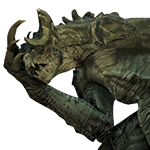

my favorite roleplaying game is BombermanNot really if you look at it. Role Playing Game. Playing a Role not Role Combat Game or Role Playing Combat.combat is one of the traditional pillars of gameplay on a RPG,
Imagine if I was to play the role of a scholar or monk, would combat be a "pillar" of my character















Here's a little extra we prepared exclusively for forums from the "Introducing: Low City" deleted content. It sheds more light on the origins of future Warsaw City:
FYI: We're doing a Q&A with the author of the Gamedec book series who's also working on a game. If you have any questions - fire away















One of the tiers from our Steam Wishlist Challenge was a Q&A session with Gamedec book series author, Marcin S. Przybyłek. We've recorded the stream and decided to share it for those who couldn't watch it live. Enjoy!
Steam Wishlist Challenge: Exclusive Concept Arts Unlocked!
We've reached our next goal in the #WishlistChallenge!
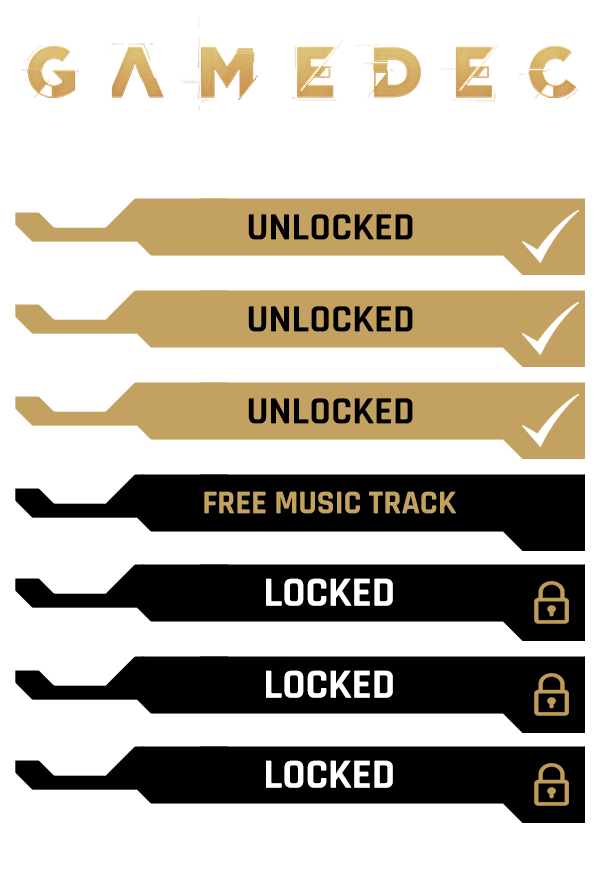
Thanks to your commitment, we can share some exclusive concept arts as a form of gratitude and appreciation. We asked Marcin S. Przybyłek to describe them for you so that you can get some extra context to the scenes.
Before we go to the concept arts, we want to share with you our next step on the Wishlist Challenge. If we manage to achieve 16k on Gamedec's Wishlist, we will share a free music track to get you into the mood. Later on, when we gather enough tracks, we will prepare an Official Soundtrack album, but the details on how and where to distribute this OST are still into talks.
Object:
Aurocars
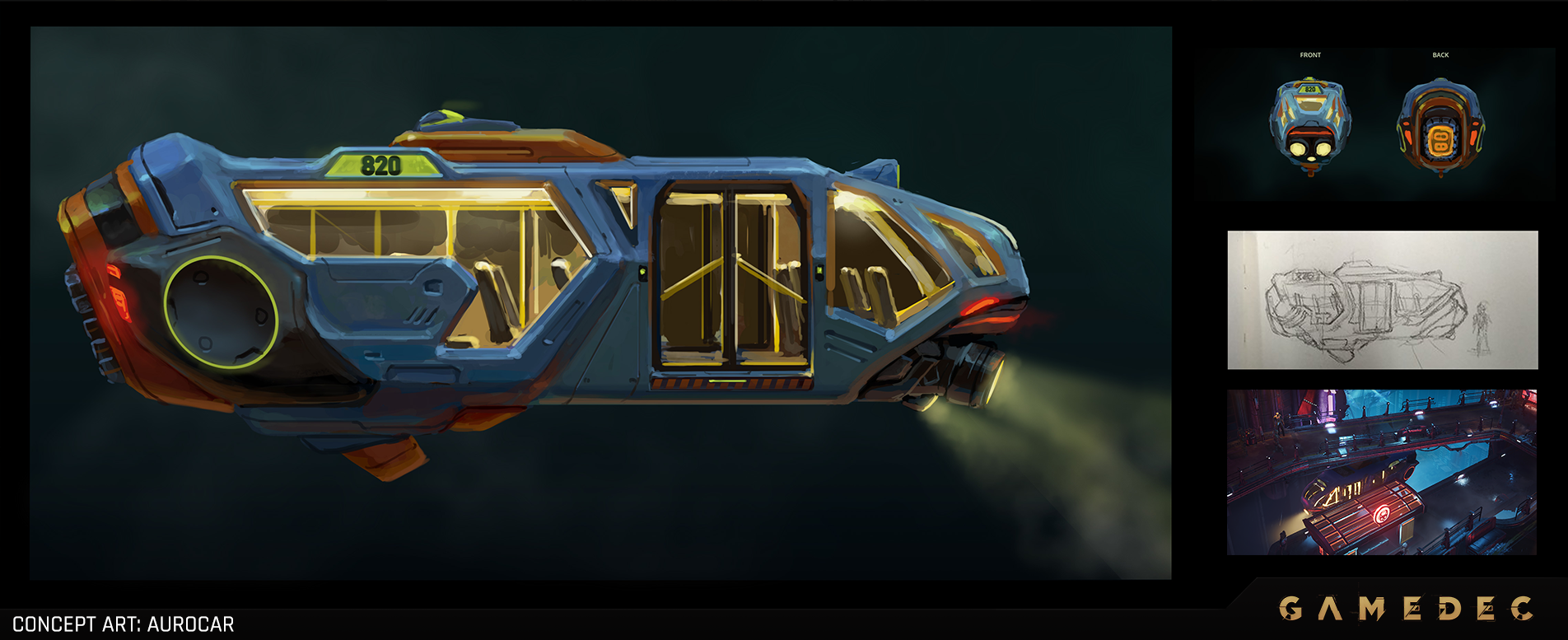
Aurocars are a means of transport in the lowest parts of polis, where piloting pneumobiles is prohibited, and Public Transport Tubes have no tracks. It is the oldest way of moving from A to B, in fact, the first public transport in every polis in Gamedecverse. They have strong lights as in Low Cities it is always dark. Some older people say you had to buy tickets on special machines to use aurocars. Those times are gone now. But the vehicles still work — tough bastards.
Location:
Yeti's Bar vibes
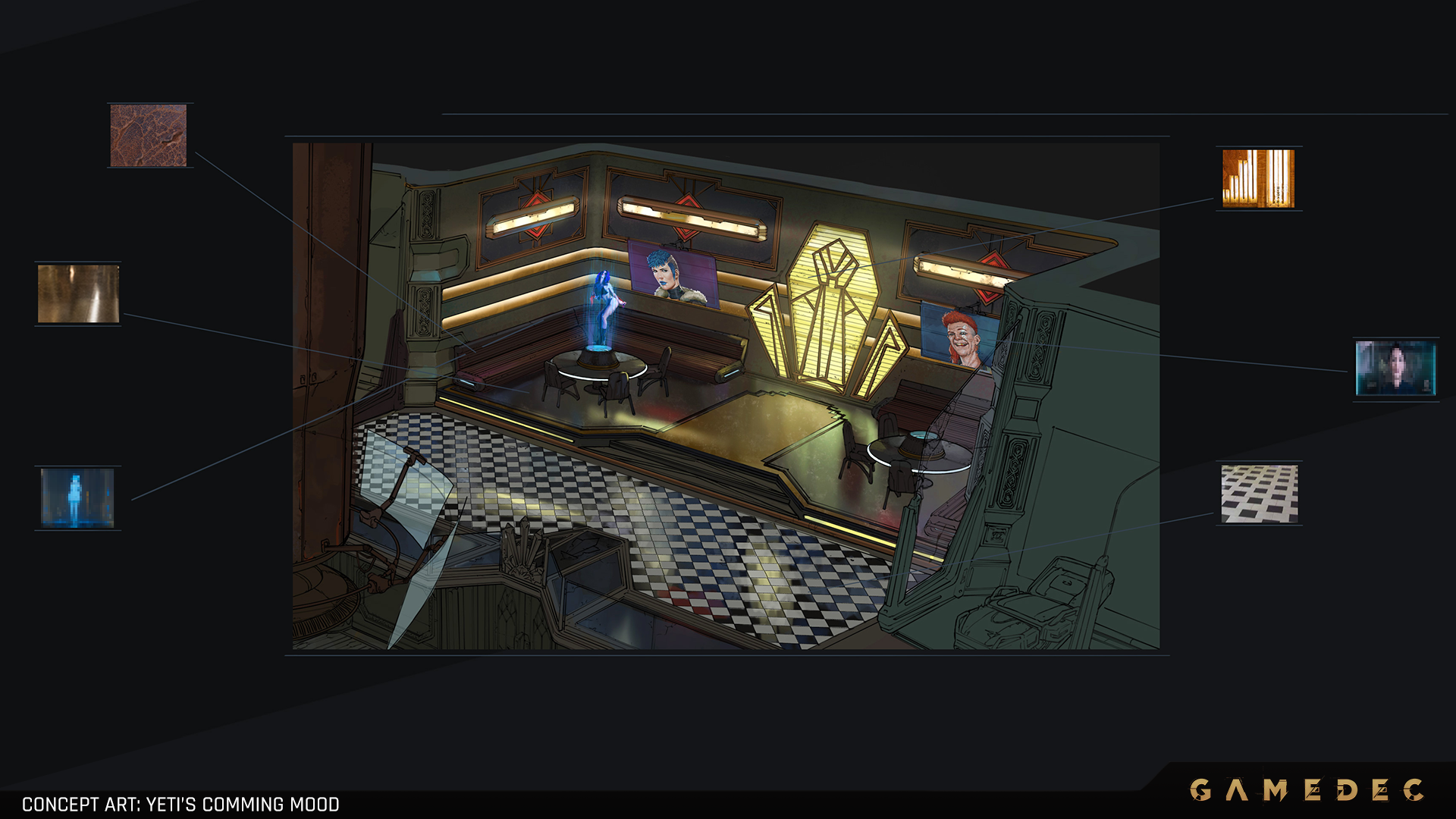
In Gamedecverse you can find very dense ornamentation. There are many styles, and Art Décor is one of them. The choice of a given style depends on the taste of the premise owner. Old Yet, who is the manager of the Yeti’s Coming night club, always liked sharp, geometrical forms and applied art. He remembers the guests like to be entertained, so there are holoprojectors on every table and additional wall screens. If you pay, you deserve it.
NPC:
Kid
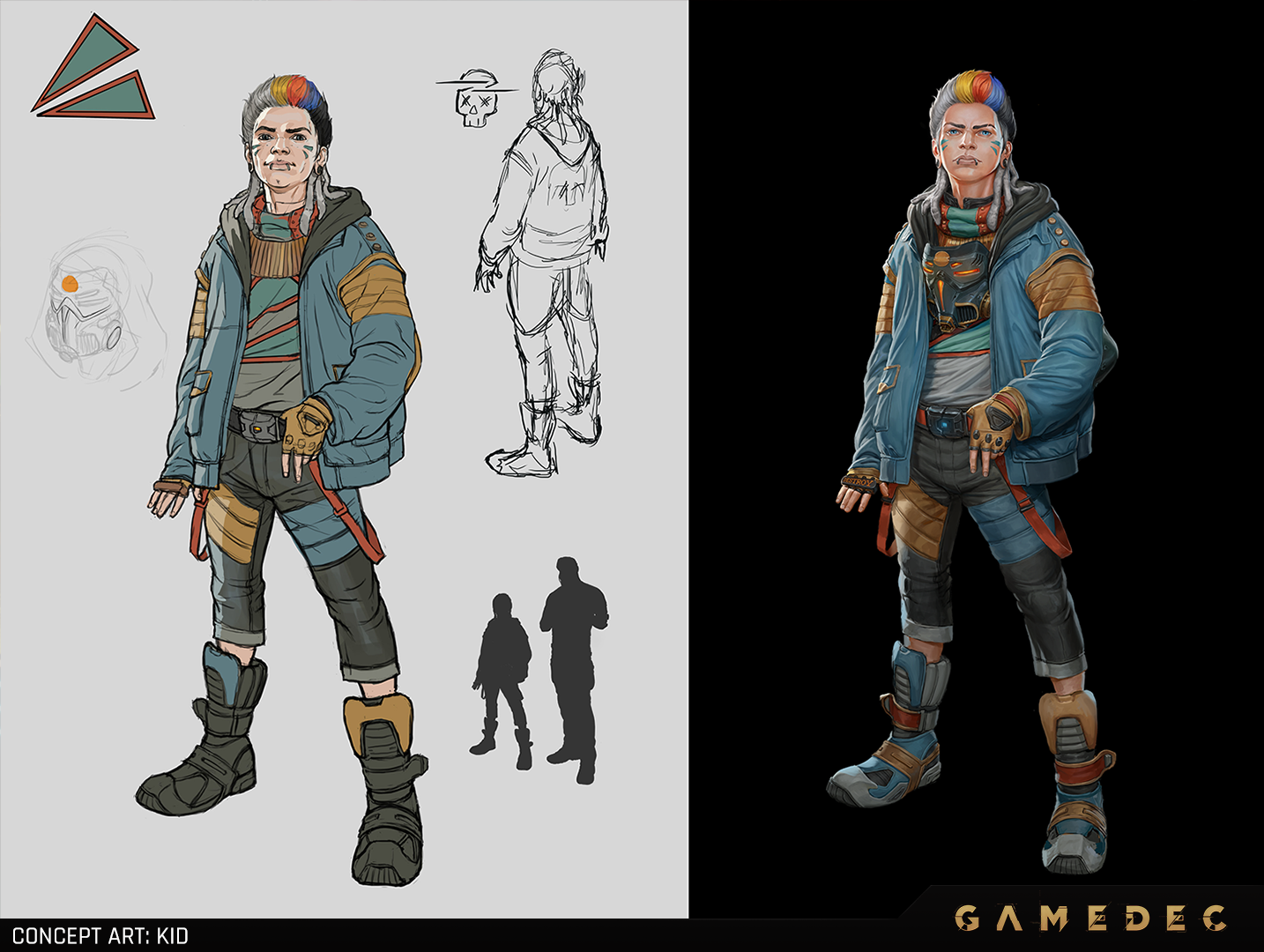
This teenager is known in Low City just as a “Kid.” Don’t be fooled by his young age. In Low City, you grow very fast, and Kid got to know life the hard way. He knows how to survive and uses many ways to do that. He trades the game artifacts, knows the cheats (and sells them), knows how to get to the VIP part of Yeti’s Coming club, and handles the talk to the clients in a professional way. That is if you are tough. If you are not, Kid will eat you alive.
If you want to be notified about news and announcements, remember to choose a follow option on our game's Steam Store Page.
Check out what we’ve prepared for you and spread the word to your friends – let's unlock some cool stuff together!















Here's a little extra we prepared exclusively for forums from the "Introducing: Low City" deleted content. It sheds more light on the origins of future Warsaw City:



















Cyberpunk RPG Gamedec reveals the first of its many virtual worlds
Cyberpunk meets the Wild West.
Gamedec is a cyberpunk RPG where you play as a private detective solving crimes in virtual reality. Unraveling mysteries will require you to commit to some tough interrogation, collect evidence and, of course, a whole bunch of hacking. In Gamedec's first dev diary, we got to learn more about Low City and its seedy underbelly. In this new one, Anshar Studio reveals one of the virtual reality worlds you get to explore—Harvest Time.
Milking cows and growing vegetables aren't the first, second, or tenth thing that comes to mind when I think about a cyberpunk RPG, but Anshar Studio says that this is exactly the reason it wanted to include Harvest Time in Gamedec. Producer Radosław Maciạg says that the team wanted to do something unusual and fresh to break away from Cyberpunk's classic themes.
Harvest Time plays out a little like Farmville; it's a free-to-play game where players in the world of Gamedec can log in, grow crops, milk cows, and do fairly simple farmyard tasks. Marcin Przybyłek, the author of the Gamedec books, explains that having a farming sim isn't unusual at all because in the Gamedec universe people are afraid of nature, so being in a world where you can touch plants and help them grow is an appealing fantasy for some.
However, there is a sinister side to the happy-go-lucky players in Harvest Time. Players don't actually own a farm due to a lack of in-game money, so they work for someone else. The farming simulator has its own loot box system in the form of chests that players can get from simply playing the game. These two features create a hierarchy where players get addicted to getting chests and powerful farm owners are exploiting their manual labour. This need for chests means that working in Harvest Time, as Przybyłek describes it, is like having a second job to players in the Gamedec universe.
It's not made clear what the mystery in Harvest Time will be, but Anshar Studios hints that there are players who are abusing shortcuts to earn more money and that players are mysteriously collapsing in-game. Fraser Brown got a sneak peek at it last year at Gamescom, when the detective got a job to investigate Harvest Time players getting sick.
Anshar Studio hasn't currently announced a release date for Gamedec but the Cyberpunk RPG should be releasing sometime in 2020.






























Explore another virtual world from Gamedec – Harvest Time - one of the virtual worlds available in this story-driven, cyberpunk-themed adaptive RPG. As a virtual detective, you investigate multiplayer games where an abuse of power or the exploitation of players may have occurred. In a farming game like Harvest Time, anything is possible behind the scenes. Check the developer diary to see what’s inside one of the worlds from the Gamedec multiverse. Catch a glimpse of what’s going on behind the curtain of the sole source of entertainment for people of the XXII century.
At first glance, Harvest Time is an idyllic game, perfect for people who want to relax after a long and industrious day. And it is – unless you approach it too seriously, or take advantage of the game’s mechanisms to make money. People react to hierarchies automatically, always trying to improve one’s position – and the game designers exploit this. You start grinding, without always knowing why. And if there’s any chance of earning real money, players will take advantage of it, too.















Steam Wishlist Challenge: Free Music Track Unlocked!
We have reached 17k on Steam Wishlist!
Thanks to our community, we've reached the 17k tier on our Steam Wishlist Challenge, and as a token of gratitude, we want to show you a glimpse of the style we want our OST to go.
Music composer - Agnieszka Rumińska
Mixing and Mastering Engineer - Tomasz Wójtowicz
Wondering what's going to be the next tier unlock? The very first chapter from Gamedec: The Edge of Reality book - for the first time - in English!
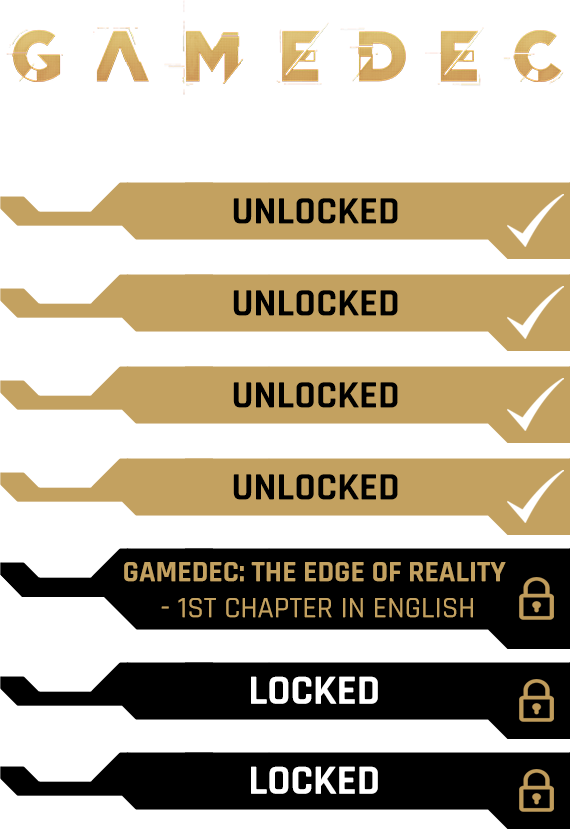
If you want to be notified about news and announcements, remember to choose a follow option on our game's Steam Store Page.



















Gamedec Preview – Disco Elysium Meets Cyberpunk
As one of the first journalists in the world, I had a chance to try Gamedec, the new RPG from Anshar Studios. And I have good news! If all goes well, this game can make some noise.
Slated for release: 2020.
This text was based on the PC version.
RPGs change. Even the isometric role-plays harking back to the classics had to move forward to survive. However, "move forward" isn't tantamount to "compromise." Disco Elysium has knocked the doors down for the players who want to immerse in the story, play a character, and completely forget combat. The title provided an experience as close as possible to traditional RPG sessions. Cyberpunk Gamedec jumps and rides on the same wagon. I talked to the developers, played the pre-alpha version, and decided it would be a strong title. The next (small) big thing. The indie that roared.
HELLO, DETECTIVE! AFTER HEARING THE TESTIMONY AND OUR CONCLUSIONS, YOU WILL LEARN:
Each game has a story behind it
- What is Gamedec and how does it differ from most RPGs?
- How does the universe work?
- Who is Gamedec?
- How is this project created?
- What will the players say over a beer when they finish playing?
Going to the show, I didn't really know what to expect. The first trailer and screenshots foreshadowed a moody RPG with a strong focus on storytelling, and an unusual world. And at the same time, the materials did not really say anything specific. As a result of an amusing incident (which I'll write about later), I received an invitation to the studio to see for myself what's what. It was a cold and bleak day, seemingly the default setting of the blocks of flats of Katowice, the Polish city where Anshar Studios dwell, and where I met Marcin Przybylek, author of stories about Gamedec, and Marcin Rybinski, the lead designer of adaptation.
WHO IS MARCIN PRZYBYLEK?
The man who cried after finishing Planescape: Torment. Actually, I can understand him. Author of, among others, Gamedec, White Eagle and CEO Slayer. Together with Anshar Studios, he's creating an adaptation of his book series. As a full-time employee, he acts as a consultant on the story, world, characters, and aesthetics, and also writes some of the texts and dialogs.
After seeing the presentation, playing the game, and talking to my hosts, I can safely assume that Disco Elysium has got a worthy rival. Or at least a partner in a crime, depends how you look at it. After all, this territory has not yet been conquered by either Baldur's Gate or Divinity. This was once the reign of the Lady of Pain, Planescape: Torment. But that was a long time ago. And although it's fun to return to the first Torment, you need to keep up with the times. And Gamedec with Disco Elysium are happy to take your hand and do just that.
It all started five years ago. Przybylek is privately an avid player, and he'd been trying to get in touch with any developers for a while. He gave talks about the world of Gamedec, appeared on industry events, and spoke enthusiastically about his favorite titles at conventions. Eventually, the books and the universe intrigued the head of Anshar Studios, Lukasz Hacura. Then, there was the first contact, the negotiations. Przybylek eventually he joined the team.
Gamedec started as a much smaller project. It was conceived as a narrative card game. A few possibilities were considered – including a battle game, text-based adventure, or a simple survival. But the boss eventually decided to go more ambitious.
At some point, we called Lukas, and I said "Look, maybe we can stop talking about all these weird game ideas, and just make a cool adventure?" And then he said "I had the same idea, but how about an RPG?" I say "RPG? That's even better!"
Marcin Przybylek
Marcin Rybinsky, together with the second designer, started the initial project. The prototype worked on ready-made, generic fantasy assets. But despite the improvisation, they knew it was legit. The idea caught on with the people in the studio, and Przybylek himself. It looked fresh. Already in that early stage of production, Gamedec abandoned a typical combat system in favor of creating a smooth, immersive narrative.
Because it's true. What's fighting like in books, movies, and narrative RPG sessions? It's quick, brutal, and finishes quickly. No complicated mechanics or tactics that would knock us out of immersion. Because experience is the basis for communicating with art – any art. Of course, there will be violence and combat in the game, but they'll be presented as scenes to play out, involving moral choices, rather than tests.
That was before Lukasz and Marcin's call we mentioned. We took a break (after the pre-production – ed. note) for another project (...). After that, I told Lukasz that I didn't really feel it, and it just so happened that he wanted to make isometric RPGs. That's the company's long-term goal. We want to deliver emotions more than just adrenaline and dopamine. ( ... ) And the head of the company said: Well, then, perhaps, let's expand the budget and make an RPG. "An RPG," I thought. "We must do something about it." Adapt it to our capabilities. How do we remove combat? This is probably the most expensive. We will make an RPG without combat, mechanics, numbers, and items. We will make a cool interactions, write a good story, everything will be fine... Now we know why there are no RPGs without combat. Or just why there are so few games like Disco Elysium. Removing combat creates a gap that's hard to bridge. It's much easier to design a combat system than draw up story branches that will keep the players engrossed. Making an RPG without combat is not really cheaper. But we made a prototype in Unity, with a single designer, to see what it might look like, whether it might make sense. And everyone liked it.
Marcin Rybinski
Indeed, in the course of the gameplay, I did not feel any monotony, despite the seemingly classic model. And the reason for it is that the classicality hides a ton of unusual solutions take straight from other genres.
Brave, new world
Gamedec takes us into a cyberpunk universe processed in the mind of the writer (and now, also the devs from Anshar). This is a world, where people live in two worlds – physical, and digital, or sensory. The former has changed a lot since the last time you looked outside the window. Warsaw City, the backdrop for all the events in the game, resembles a soaring forest crisscrossed with a network of streets suspended in the air. Anti-gravity cars, designed in a retro aesthetic, sweep through the city. The megalopolis is surrounded by a barrier that keeps animals out. The entire nature has apparently turned against men, and everything wants to kill us. Well, karma can be a bitch, and we've had it coming anyway.
The peaks of the city are bathed in prosperity and sunshine, which of course does not reach the lowest levels. The world is much more complex than the classic, cyberpunk Noir, and we'll get a full cross-section of different aesthetics. Everyone – the rich, the poor, and the "middle class" – have one thing in common. They can cross the frontier of reality.
Sensory worlds are basically very advanced VR sets that work for all of the human senses. With the right technologies (a bed, a helmet that sends electromagnetic pulses to the brain, and a suit), the experience became indistinguishable from the reality. And every world is a different game. Some work like Second Life, or simple browser games, while others take us for a review of video game genres. There will also be something for fans of dangerous, depraved, and not quite as moral entertainment. We are always looking at a complete immersion in the virtual world.
Profession: detective. Gaming detective
I've come to associate the profession of a detective with freedom, the ability to find out the truth. A detective is a person who has chosen the profession, usually at some interesting point in their life. It could have been a kind of reassessment, or just crisis.
Marcin Przybylek
It's a person who needs a large share of wisdom and intelligence. Why is a detective perfect for an RPG? Because they're prefect for the carte-blanche sort of scenario. He has a certain set of qualities, including personal, but he can be anyone.
Marcin Rybinski
This world needs a professional. A Gamedec. The gamedec, as Przybylek says, is the profession of choice for contemporary gamers. Gamedecs are not only really good in the virtual entertainment – they make good money off it. The work, contrary to what you might assume, isn't limited to simply fighting crime in sensory worlds. To earn money, Gamedecs also fulfill smaller orders from players. One of their jobs is, for example, completing difficult stages of the games that their employers have hard time finishing.
I have much in common with Sapkowski. ( ... ) In my opinion, the success of the Witcher was about the profession. It's just a very clever profession that opens up a lot of opportunities. Gamedec is also a great profession, which opens opportunities. It is set in a cool world, very carefully designed. ( ... ) Gamedecs enter the game either to play or to make money. Most often the latter. ( ... ) I realized that this is a person who lives on the edge. On the edge of reality. Once he enters the game, he realizes that although he's experiencing something fictional, the very experiences are real.
Marcin Przybylek
In the game from Anshar Studio, we sometimes do smaller gigs, the mainstay are crime investigations. We will learn the story throughout the dozen or so chapters of the game. Each chapter is a case, in which we explore a chunk of the city and a new sensory world. Each of them holds a new mystery that needs to be solved, and everything is tied by the main thread. My hosts didn't want to reveal what the pivotal conflict of the intrigue will be, but we talked a lot about the general premises.
The first materials suggested that Gamedec would focus on video-game-related issues, but that's only the first layer. Sure, the devs want to give us some funny easter eggs, laugh at some of the industry's fallacies, but it's all going to be rather relaxed. The gamedec will, most of all, face the evil that lurks inside peoples' hearts.
Gamedec will try to hit stronger notes, show mature, complex issues, and the developers promise not to compromise. And we have to get to the bottom of things. We can do this if we are vigilant, attentive, and accurate. We learn the details of every crime that ties the physical and virtual reality.
Investigation is the easy part of the job. Because then we have to decide what to do with this truth. In the end, along with the facts, we also learn the motives of the criminals, the history – usually ambiguous – of the victims, and suddenly it turns out that nothing is black and white. On the way to the target, we also often stand at a fork. In fact, Gamedec is a game about choices. This aspect was the focus of the developers.
The way of the detective
The idea with Gamedec is that each decision has proper weight and consequences. At the same time, however, devs try to avoid simple divisions. The balance of gains and losses of our choices will not be symmetrical, but none of them will prevent us from progressing in the game. It may prohibit reaching some particular branches of the story, but it might just as well open up a new one. If we do not help someone at some point, this person may complicate our work – seems logical enough. Everything depends on us, and the game will follow our decisions (the term "adaptive RPG" obliges).
We want to achieve such an effect. Friends meet for a beer and talk about Gamedec. One tells the other how he solved the case, and the other says "I think we played different games, because I did something totally different..."
Marcin Rybinski
We make choices in several ways, mostly through dialogs and a deduction system – both related to character development, and sometimes to the order in which we visit subsequent locations. As I was going through the already revealed chapter, Harvest Time, I was wandering aimlessly through a western land, and accidentally came across a key NPC. As Marcin Rybinski said, I could lure that character in different ways, and hence obtain more complete information. I love the fact that the environment was harnessed for purposes of storytelling as well.
As for the mentioned mechanics, let's start with the dialogues. They say in the beginning was the word, so I think it's a good choice. Originally the game used the classic solution: full statements visible immediately in the dialog window. Like in Pillars of Eternity or the good old Baldur's. But Gamedec will struggle for the attention of a modern audience, so some changes we inevitable, and the conversations will resemble those from Deus Ex: Human Revolution. We will get a round menu with short versions of what the hero can say. To avoid the same pitfall that Mass Effect and Fallout 4 have fallen into, hovering the cursor over the given dialog option will reveal the full statement. Simple, compact – I think it will work great.
Conversations and choices in general were merged with the character development system. You won't find any numbers there, oddly enough. We don't need them, because the game features neither typical combat, nor any kind of number-based tests. We shape our hero using the specializations we choose. The menu looks like a neuron network – Przybylek says he likes the comparison. Talents (or 'Aspects') were grouped within several branches. Some of them promote conflict and violence, while others allow for deeper intervention in technology or interaction with people. Then, the paths are branching out again – to make our character as specialized as possible. We can try to go in all directions, but then we won't reach higher skill levels, or specialize in just a few areas. There will be quite a few combinations and there will be enough for several completely different gameplay variants.
To quote the other Martin. You see, in an adventure game, the player must guess the devs' intentions. (...) In an RPG, it's the game that guesses the player's intentions.
Marcin Przybylek
The specializations open very specific possibilities in the story, while the tree is expanded with the choices we make. This approach is supported by the above-mentioned system of investigation (something similar was used in adventure games about Sherlock Holmes), which ties subsequent chapters together. In a special window, we open the evidence map. When we collect as many as we deem necessary, we decide on the final conclusions. On their basis, we specify the perpetrators, and then decide what to do with those we find guilty. At the same time, this opens up unique options for dialogue.
These three aspects are combined into a dynamic and very complex dependency grid. All that to ensure players will get an experience as close as possible to a session with a table-top RPG. Many employees of Anshar are fans of traditional RPGs. Martin Rybinski told me that each chapter of Gamedeca is first tested as an analog RPG session in different groups, so that the devs can see what works and what doesn't.
This is very important to us. We want Gamedec to really feel like a table-top. Like sitting with a group of friends, having someone conduct the game, and just making free choices, having full autonomy. And what is the most important and interesting thing in an RPG? Choices, interactions. The simple fact that you can get lost, solve problems. This leads to situations that are interesting and memorable. We have confrontations, but we build them with storytelling.
Marcin Rybinski
At the same time, we do not play as the hero from the books, but as a gamedec created by ourselves, whom we can extensively personalize both before we begin the game and as we play.
History of violence
I looked at it this way: How would I feel if someone wanted to make an RPG with combat? I would have had to come up with situations when there is no other solution than force.
Marcin Przybylek
However, focusing on dialogue, deduction, and choice does not mean we always avoid violence. Only the creators approach it as something special, something that influences the character's psyche. It should be something that we will not just be able to shrug off; a difficult choice dictated by what we consider necessary, rather than a joyous mowing down of dozens of enemies. Therefore, the designers decided to depict violence in animated scenes. From what I saw in the trailer (I didn't see it in the game) – this is done within dialog selection. Anshar, however, considers implementing a separate system of confrontations, but that's about the only thing I'm allowed to say.
The player will also sometimes "see" something violent happening nearby – it will be possible to take action in such a case. Gamedec will give you a hard time, the creators are already showing they're not taking any prisoners – and the intertwining of two planes of reality gives them an extra field to tackle mature topics. I hope they won't be short of ideas.
Gamedec won't be about just talking to people and collecting evidence. The creators are well aware that then the players would be killed by the monotony, regardless of how well-written it would be. They try to diversify the gameplay with various interactions with the environment and non-invasive arcade stages. I had the opportunity to collect some hay in Harvest Time, a farming RPG game, and play other activities specific to F2P games (for example, facing a paywall and having to collect enough money). Then, there was a sneaking stage. I had to avoid being spotted, and distracted guards with different noises. Simple, intuitive. It works.
There should be more of these diversions. Rybinski admitted with a laugh that at first, he'd thought that the game would be easier to produce without the combat system, because there would be no formulas, comprehensive inventory systems, and balancing issues, but then it turned out that compensating for it isn't very easy. Well, the toys I've already seen do work. They fit well into the narrative and the tone. We'll learn about the rest when the game comes out.
SAVING SYSTEM
At this point, we can save the game at any time. However, Rybinski is considering introducing a hardcore mode, called True Detective, where saving would only be possible between subsequent cases – or even more hardcore, having only the auto save. Just to make sure you feel the gravity of your decisions.
Contracts
Working on such a project is like playing Hitman – a single mistake and you're done for. Gamedec makes bold decisions. This is an ambitious project where a lot can go wrong. All those interactions with the environment can be a misfire, the plot may fail our expectations. Even if everything works out, the game may just fall short of convincing a larger group of players. Many RPG fans appreciate aspects like fighting and power – it's fun to collect all these powerful swords and weapons. Who will come to Anshar, if these aspects are missing? I know the game is aimed at mature players, but is that enough? Well, concerns are only natural.
On the other hand, I walked around the studio and talked the people. I saw they were dedicated and involved, convinced that what they're working on was at least intriguing, perhaps even unique. The demo I was able to try also speaks in favor of Gamedec. I saw a very pleasant game, an engaging story, and well-written dialogs. If this is not enough – the game also looks really good. It runs on Unreal Engine 4, but the strength lies in the very consistent aesthetic designs of locations, characters, and cars. The world is credible, really reminiscent of Netflix's Altered Carbon, and riveting.
And the risks? Well... There's no doubt that cyberpunk is becoming fashionable again. The hyped players will be looking for different takes on these aesthetics. Gamedec promises to be more than just another RPG capitalizing on nostalgia.There's a good chance that you've just read an article about a game that, together with Disco Elysium, will push the genre in a new, fascinating direction.







